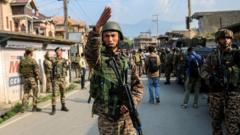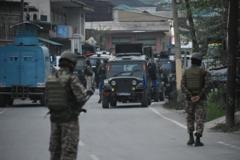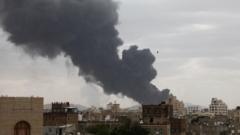The volatile situation raises fears of escalating hostilities between the nuclear-armed neighbors.
Explosions in Pakistani Kashmir Heighten India-Pakistan Conflict

Explosions in Pakistani Kashmir Heighten India-Pakistan Conflict
Reports of blasts follow India's vow to retaliate for a deadly terrorist attack.
The ongoing strife between India and Pakistan has intensified as explosions were reported early on Wednesday in the capital of Pakistan-administered Kashmir, Muzaffarabad. This escalation comes two weeks after an attack in India that resulted in the tragic deaths of 26 civilians, prompting India's pledge of military retaliation against what it alleges to be Pakistan-supported terrorism.
Witnesses in Muzaffarabad reported hearing explosions and the sound of jets overhead, suggesting that a location associated with the militant group Lashkar-e-Taiba was targeted. This incident follows a tragic shooting on April 22, where gunmen opened fire on tourists in India’s Kashmir, marking one of the most severe attacks on civilians in recent history. India swiftly accused Pakistan of involvement in the violence, leading to a series of retaliatory measures including threats to disrupt a critical river system that supplies water to Pakistan.
Although the Pakistani government has denied any involvement, the rhetoric from both sides has grown increasingly hostile. Following the attack, Indian authorities launched extensive operations, leading to hundreds of arrests in the region, all while cross-border skirmishes were reported.
The recent airstrikes signal a new phase in this longstanding dispute, raising alarm that tensions could spiral into a broader confrontation, given that both nations possess nuclear arsenals. The Pakistani administration has warned of a stern response to any aggressive moves from India, amplifying fears of a potential conflict that could wreak havoc on both countries and beyond.
Witnesses in Muzaffarabad reported hearing explosions and the sound of jets overhead, suggesting that a location associated with the militant group Lashkar-e-Taiba was targeted. This incident follows a tragic shooting on April 22, where gunmen opened fire on tourists in India’s Kashmir, marking one of the most severe attacks on civilians in recent history. India swiftly accused Pakistan of involvement in the violence, leading to a series of retaliatory measures including threats to disrupt a critical river system that supplies water to Pakistan.
Although the Pakistani government has denied any involvement, the rhetoric from both sides has grown increasingly hostile. Following the attack, Indian authorities launched extensive operations, leading to hundreds of arrests in the region, all while cross-border skirmishes were reported.
The recent airstrikes signal a new phase in this longstanding dispute, raising alarm that tensions could spiral into a broader confrontation, given that both nations possess nuclear arsenals. The Pakistani administration has warned of a stern response to any aggressive moves from India, amplifying fears of a potential conflict that could wreak havoc on both countries and beyond.





















